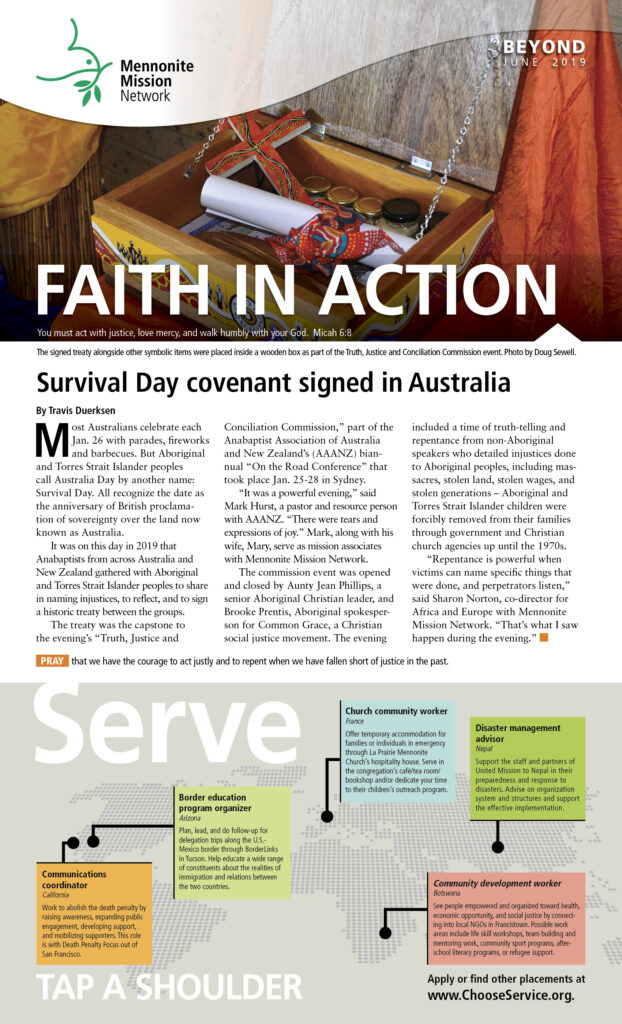Most Australians celebrate each Jan. 26 with parades, fireworks and barbecues. But Aboriginal and Torres Strait Islander peoples call Australia Day by another name: Survival Day. All recognize the date as the anniversary of British proclamation of sovereignty over the land now known as Australia.
It was on this day in 2019 that Anabaptists from across Australia and New Zealand gathered with Aboriginal and Torres Strait Islander peoples to share in naming injustices, to reflect, and to sign a historic treaty between the groups.
The treaty was the capstone to the evening’s "Truth, Justice and Conciliation Commission," part of the Anabaptist Association of Australia and New Zealand’s (AAANZ) biannual "On the Road Conference" that took place Jan. 25-28 in Sydney.
"It was a powerful evening," said Mark Hurst, a pastor and resource person with AAANZ. "There were tears and expressions of joy." Mark, along with his wife, Mary, serve as mission associates with Mennonite Mission Network.
The commission event was opened and closed by Aunty Jean Phillips, a senior Aboriginal Christian leader, and Brooke Prentis, Aboriginal spokesperson for Common Grace, a Christian social justice movement. The evening included a time of truth-telling and repentance from non-Aboriginal speakers who detailed injustices done to Aboriginal peoples, including massacres, stolen land, stolen wages, and stolen generations – Aboriginal and Torres Strait Islander children were forcibly removed from their families through government and Christian church agencies up until the 1970s.
"Repentance is powerful when
victims can name specific things that were done, and perpetrators listen," said Sharon Norton, co-director for Africa and Europe with Mennonite Mission Network. "That’s what I saw happen during the evening."
Pray that we have the courage to act justly and to repent when we have fallen short of justice in the past.
The three "E’s" of the Doctrine of Discovery
Wait! What exactly is the Doctrine of Discovery?
The Doctrine of Discovery is a historical rationalization that permitted Christian European rulers to invade lands and enslave people. While its beginnings were in the 15th century, its influence remains today in laws and practices that displace and destroy many indigenous peoples and other vulnerable communities.
The three "E’s" summarize the destructive results of the Doctrine of Discovery.
Enslavement—Because the Doctrine did not consider indigenous peoples to be human if they weren’t Christian, conquering nations were allowed to make slaves of the people they encountered.
Extraction—In many places around the world, the Doctrine of Discovery condones practices that take natural resources from indigenous communities to benefit those descended from colonialist nations.
Extinction—Before Europeans came to North America, there were as many as 18 million indigenous peoples living on the continent. By the end of the 19th century, they numbered fewer than 250,000. Millions of people died because they did not have natural immunity to European diseases, nor could they resist the weapons of war the Europeans used against native populations.
The three "E’s" of the Doctrine of Discovery are a tool that many organizations, such as the Dismantling the Doctrine of Discovery Coalition, have used in their efforts to educate and advocate for the rights of indigenous peoples. To learn more, visit
www.dofdmenno.org.

